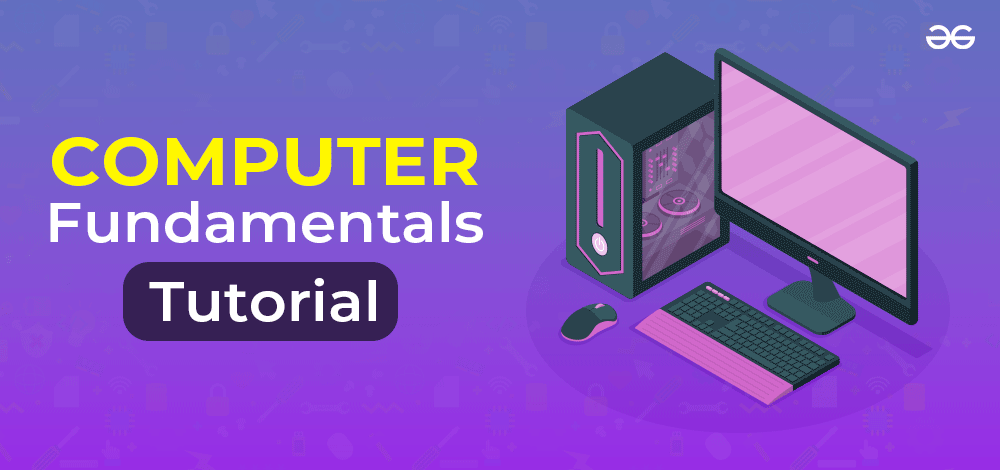Computer Fundamental Tutorial
Last Updated :
10 Jul, 2023
This Computer Fundamental Tutorial covers everything from basic to advanced concepts, including computer hardware, software, operating systems, peripherals, etc. Whether you’re a beginner or an experienced professional, this tutorial is designed to enhance your computer skills and take them to the next level.

What is Computer?
The computer is a super-intelligent electronic device that can perform tasks, process information, and store data. It takes the data as an input and processes that data to perform tasks under the control of a program and produces the output. A computer is like a personal assistant that follows instructions to get things done quickly and accurately. It has memory to store information temporarily so that the computer can quickly access it when needed.
Prerequisites: No prerequisites or prior knowledge required. This article on Computer Fundamentals is designed for absolute beginners.
Computer Fundamentals Index
Introduction To Computer Fundamentals
History and Evolution of Computers
Components of a Computer System
Computer Software
Data Storage and Memory
Computer Memory
Basics of Operating System
Computer Networks and Internet
- Introduction to Computer Networks
- Types of Networks (LAN, WAN, MAN)
- Internet
- Intranet
- Extranet
- Network Topologies (Star, Bus, Ring)
- Network Protocols (TCP/IP, HTTP, FTP)
- Network Devices (Hub, Repeater, Bridge, Switch, Router, Gateways and Brouter)
- World Wide Web
Introduction to Programming
Computer Security and Privacy
Functionalities of Computer
Any digital computer performs the following five operations:
- Step 1 − Accepts data as input.
- Step 2 − Saves the data/instructions in its memory and utilizes them as and when required.
- Step 3 − Execute the data and convert it into useful information.
- Step 4 − Provides the output.
- Step 5 − Have control over all the above four steps
The Evolution of Computers
A journey through the history of computers. We’ll start with the origins of computing and explore the milestones that led to the development of electronic computers.
|
First Generation
|
1946-1959
|
Vacuum Tube-based
|
|
Second Generation
|
1959-1965
|
Transistor-based
|
|
Third Generation
|
1965-1971
|
Integrated Circuit based
|
|
Fourth Generation
|
1971-1980
|
VLSI microprocessor based
|
|
Fifth Generation
|
1980-onwards
|
ULSI microprocessor based
|
Applications of Computer Fundamentals
- Software Development: Computer fundamentals are fundamental to software development. Understanding programming languages, algorithms, data structures, and software design principles are crucial for developing applications, websites, and software systems. It forms the basis for creating efficient and functional software solutions.
- Network Administration: Computer fundamentals are essential for network administrators. They help set up and manage computer networks, configure routers and switches, troubleshoot network issues, and ensure reliable connectivity. Knowledge of computer fundamentals enables network administrators to maintain and optimize network performance.
- Cybersecurity: Computer fundamentals are at the core of cybersecurity. Understanding the basics of computer networks, operating systems, encryption techniques, and security protocols helps professionals protect systems from cyber threats. It enables them to identify vulnerabilities, implement security measures, and respond effectively to security incidents.
- Data Analysis: Computer fundamentals are necessary for data analysis and data science. Knowledge of programming, statistical analysis, and database management is essential to extract insights from large datasets. Understanding computer fundamentals helps in processing and analyzing data efficiently, enabling data-driven decision-making.
- Artificial Intelligence and Machine Learning: Computer fundamentals provide the foundation for AI and machine learning. Concepts such as algorithms, data structures, and statistical modelling are vital in training and developing intelligent systems. Understanding computer fundamentals allows professionals to create AI models, train them on large datasets, and apply machine learning techniques to solve complex problems.
FAQS on Computer Fundamentals
Q.1 How long does it take to learn computer fundamentals?
The time required to learn computer fundamentals can vary depending on your prior knowledge and the depth of understanding you aim to achieve. With consistent effort and dedication, one can grasp the basics within a few weeks or months. However, mastering computer fundamentals is an ongoing process as technology evolves.
Q.2 Are computer fundamentals only for technical professionals?
No, computer fundamentals are not limited to technical professionals. They are beneficial for anyone who uses computers in their personal or professional life. Basic computer skills are increasingly essential in various careers and everyday tasks.
Q.3 Can I learn computer fundamentals without any prior technical knowledge?
Absolutely! Computer fundamentals are designed to be beginner-friendly. You can start learning without any prior technical knowledge. There are numerous online tutorials, courses, and resources available that cater to beginners.
Q.4 How can computer fundamentals improve my job prospects?
Computer skills are highly sought after in today’s job market. Proficiency in computer fundamentals can enhance your employability by opening up job opportunities in various industries. It demonstrates your adaptability, problem-solving abilities, and ability to work with digital tools.
Share your thoughts in the comments
Please Login to comment...